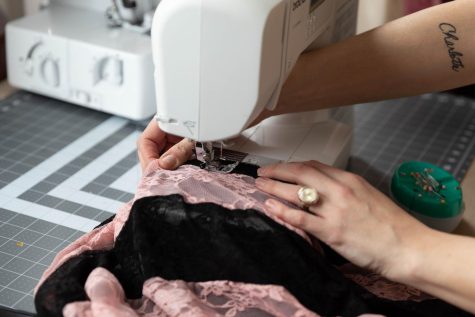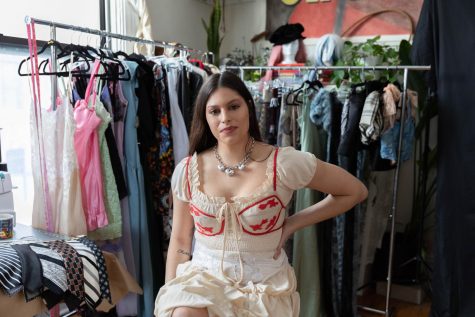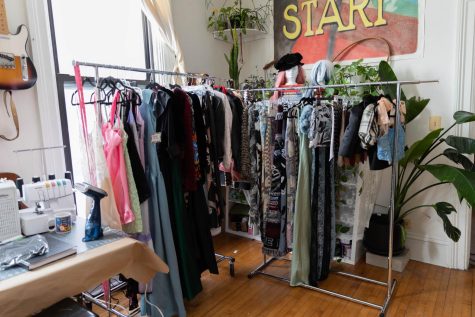Sustainable and stylish: Rocky Vintage’s curated collections tap into ethical fashion trends
February 3, 2022

Sustainability has been on the forefront of consumers’ minds as vintage fashion experienced a resurgence during the pandemic. Chicago’s fashion universe has seen a transformation in fabric upcycling from the runways to small businesses creating high-end, accessible clothing.
Alyssa Wright is the creative director and owner of Rocky Vintage, which has grown from a small Etsy shop to a “multitude of branches.” Rocky offers vintage clothing, housewares and Wright’s original designs that can be found at the Holy Thrift online marketplace and local vending and pop-up events.
Wright experienced different sides of the fashion industry, from attending New York Fashion Week to hunting for fabrics at local thrift stores, but sustainability is at the forefront of her curations and collection launches.
“Ever since I was young, I was always somebody who would draw over their shoes and paint their pants and cut up clothes,” Wright said. “That’s how my brain works. I feel like I just like deconstructing something and seeing what else it could be.”
Colbey Emmerson Reid, chair of the Fashion Studies Department, said in an email to the Chronicle that she has experienced a vintage trend resurgence and has bought from secondhand shops as sustainability plays a role in her shopping.

The trend revival is commonly seen in Gen Z and college students as they make up the majority of secondhand shoppers.
“[Vintage clothing] allows for more expression of a funky, personal style not necessarily tethered to mainstream trends that’s more sustainable,” Reid said. “It makes it possible to show off your sense of style and not your bank account balance; streetwear, especially sneakers, trend with respect to buying resale, have made vintage cool and even luxe.”
Reid gravitates toward clothing and accessories that have a “good story attached to them.” She owns vintage and antique fur coats instead of purchasing new ones so she can “honor the creatures used to make them.”
Reid’s tips on buying pieces in good condition include asking fashion dealers about design history and buying from antique shops or estate sales.
“Estate sales and auctions are good places to pick up beautiful things for very little money, plus it’s an adventure to bid for things,” Reid said in the email.

Joseph Rout, a fashion studies major at Columbia, is drawn to sustainable clothing because of environmental justice issues and the dangerous treatments of garment workers.
Rout doesn’t purchase from brands whose sourcing isn’t ethical and stays away from fast fashion since it’s one of the biggest contributors to water pollution.
According to Forbes, the apparel and textile industry is a major benefactor of water pollution. Forbes reported that in 2015, the industry used “79 billion cubic meters of water.”
As a designer and secondhand lover, Rout experienced people thrift for the purposes of making a difference in their environmental footprint.
“Buying sustainable and buying secondhand, which is basically what vintage is, is really important to minimize our footprint. This has given us a reason to shop with a more levelheaded conscience,” Rout said. “The accessibility that [online shopping] provides allows people to get into whatever they want very quickly.”
Wright said the vintage and upcycling community is “passionate” and “heartfelt” about selling and creating clothes that can be featured on fashion marketplace apps such as Depop, Etsy and Poshmark.
“They made it more accessible to people who wouldn’t normally choose to spend hours going through thrift stores or people who live in areas that don’t have good secondhand shops,” Wright said. “I think that pop-up flea market style of events are really special because they bring secondhand shopping into a social atmosphere where everyone can shop multiple vendors.”







